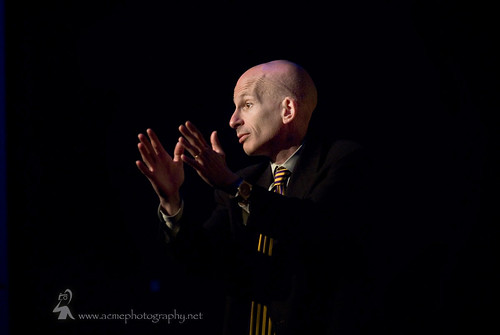“It’s not up to you whether you are the best. It’s the market’s opinion.”
–Seth Godin
It’s early morning in Tempe, Arizona, and Seth Godin is about to speak about his new book “The Dip”, which is a book about quitting. Here are Adam Nollmeyer‘s photos.
(Sidebar: We have 250-300 people here today, which is supposedly one of Seth’s larger audiences. We got him here because he said he would come to any city where people wanted to come. The City of Tempe and Sitewire sponsored him, and he’s speaking at the Improv at 9 AM. )
You can imagine how weird this is. Seth is saying he’s never spoken in a nightclub before.
We’re on the beginning of his book tour. His presentation is choppy. He has gone from Enzo Ferrarri quitting his job at Alpha Romeo to the Mona Lisa as the best painting in the world. Now he’s moving around to why we pay extra for THE BEST, and what makes a superstar.
We are now facing a worldwide shortage of superstars, he says. In many areas, we don’t know who’s the best.
Anecdote: Lionel Poulin started a bakery in France, a country that doesn’t need more bread. But his bread was judged THE BEST by the market, and now people fly into Paris from Japan, buy $450 worth of bread, and then fly home. Paris is a superstar. Poulin’s bread is a superstar.
Anecdote: Pinkberry yogurt stand in LA, with only two flavors of yogurt and three or four fresh toppings somehow got discovered by Hollywood glitterati and there are Hummers parked outside all the time. Now the owner’s opening 60 more.
The best is in the eye of the beholder. But the best in the world doesn’t mean the whole world, necessarily.
Seth goes on to point out that we are now in a world of infinite choices, and in this world you can no longer make average stuff and sell it to people through advertising, which was what Ford Motor Corporation and Del Monte cling peaches did.
Now you have to be remarkable.
Then you have to tell a story about it.
The story has to be true and compelling, so when you tell it to a friend, the friend tells other people.
And that’s how cumulative advantage works. Somebody points at something, and it gets a little ahead.
And once something gets a little ahead, it gets a lot ahead. The New York Times Bestseller List is a pointer, because many people only read books that are on the best seller list.
You want to be the best. But right before you get to be the best is a place called the Dip. The Dip is a screen. It divides the people who should be the best from the ones who are not.
You should not quit during the Dip, necessarily, unless you are operating in an area where you can NOT be the best (playing the cello professionally, perhaps). But very few people quit for that reason.
People quit because: they run out of time, run out of money, don’t take what they are doing seriously enough, panic, switch too easily when something gets hard, or have been trained by the American public school system to be average.
To Godin, you are better off picking a small world, with low risk, low rent, and being the best in that world.
You are facing a world in which you are a teeny needle in a giant haystack. The way superstars get jobs is to distance themselves from the average.
Don’t give control of your superstar status to anyone else. And don’t panic during the Dip. Without the Dip, you are on a dead end.
Example:The space shuttle is a dead end. We should cancel it tomorrow, because if we quit, we would create something else that would probably be better.
We want the dips to show up because they are our friends. They take us out of the dead ends and help us quit using our resources just to be average. Reject the dead end.
Life is a series of dips. How do I know if it’s a dead end or a dip? But you can measure. If you are panicking, it’s because it’s a dip. Who are you trying to influence? What am I measuring for my progress? A laser-like focus gets you through the dips. It’s like running a marathon. Different dips require different kinds of effort. You have to figure out if you have the resources to do the dip that’s in front of you.
It’s not about working harder. It’s about making a strategy choice about what you are not going to do, so you can take your resources and do something more rewarding. If you are making a sacrifice to get to a goal, make the sacrifice in a place where it’s going to pay. BEING AVERAGE IS OVERRATED.
To be the best, you have to be disruptive. You have to quit your average pursuit to devote your resources to something you can be the best at.
Quitting is thus a tactic to get you to mastery.
Is this useful advice? Sure. Is it new, no. But it’s always fun to listen to Seth weave details and anecdotes together.




{ 2 comments… read them below or add one }
Wow! You really got the gist of the presentation. Nice reiteration. Ill see you on the fat head ;-).
Yes, I have learned to take notes :-) Years and years of higher education. When someone talks, I type .